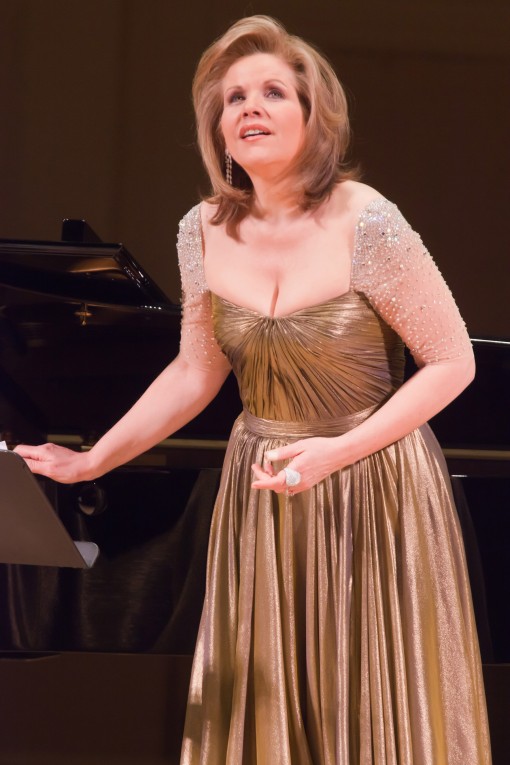Fleming brings delicate shading to ruminative Carnegie Hall program

Renée Fleming performing Tuesday night at Carnegie Hall. Photo: Chris Lee.
Prior to singing her first encore at her Carnegie Hall recital Tuesday night, Renée Fleming told the audience she was afraid people would stay away because of a snowstorm, which at the recital’s close was well underway. But she needn’t have worried. The hall was packed, notwithstanding a program that looked pitched to the connoisseur in its avoidance of anything familiar.
The first half, devoted to three interconnected composers of early 20th-centruy Vienna—Arnold Schoenberg, his brother-in-law Alexander Zemlinsky, and Zemlinsky’s student Wolfgang Korngold—was especially stimulating, not least in the opening selection, Schoenberg’s early song Jane Grey, a setting of a ballad by Heinrich Ammann about the execution of the England’s eponymous “nine-day queen” (Henry VIII’s successor) in 1554. Fleming’s quietly intense performance brought out the pathos of the story, and with Hartmut Höll’s account of the keyboard part, with its march-like rhythm and flow of arresting harmonies, the excellent pianist supplied the first of his many outstanding contributions to the evening.
Fleming’s silvery voice was heard to similarly thoughtful, well modulated effect in Fünf Lieder by Zemlinsky to texts by Richard Dehmel. Although the texts chart an extramarital affair with some degree of sensuality, Zemlinsky’s finely wrought music, replete with harmonies that often lose sight of a tonal center, establish a prevailing tone that is more austere than passionate, which is not to say they did not make an arresting impression in Fleming’s astutely shaded performances. Although much is made of the fact that Zemlinsky did not follow Schoenberg down the path toward atonality, music like this reveals that the two shared a vast expanse of common stylistic ground.
The three songs by Korngold programmed by Fleming exalted melody to an extent those previously heard did not. Especially enjoyable was the delectable Sterbelied, which bears a distinct resemblance to Marietta’s Lied from Korngold’s opera Die tote Stadt. Fleming spun out its melody with ravishing beauty.
A selection of four songs from Brad Mehldau’s 2005 song cycle written for Fleming, The Book of Hours: Love Poems to God, marked a departure from the prevailing Germanic content of the evening, even if their texts (in translation) were by Rainer Maria Rilke. Jazz lies at the root of the music here, yet Mehldau gives the songs modernistic trappings that make for an arresting interplay of styles, particularly since the vocal lines sometimes sounded like descendants of the spiritual. The controlled emotion Fleming brought to them seemed just right.
The printed program concluded with four songs by Richard Strauss, which are normally heard with orchestral accompaniments. Two of them, Winterweihe and Traum durch die Dämmerung, are gentle beauties—that Fleming sang them exquisitely was no surprise. But the other two required her to dig in more, Winterliebe and Gesang der Apollopriesterin. Winterliebe, especially, brought a welcome dose of brio to the program, but it also demonstrated that Fleming’s luminous voice also has its fragile side, a fact intermittently apparent earlier, and that while her top remains secure, now and then there is loss of vocal focus.
In the first of her four encores, Strauss’s Zueignung, she interpolated a phrase during the piano interlude before the final “Habe Dank,” apparently in accord with an alternate ending by Strauss that he ended up not preferring. One can understand why, since it detracts from the piano’s powerful buildup to the final climax.
Having whetted our appetite for Marietta’s Lied with Sterbelied, she supplied satisfaction by singing it just as beguilingly as she had the earlier song. I Feel Pretty from West Side Story was taken at an unusually fast tempo that caused words to be lost, but in Strauss’s Morgen transcendent performances from both singer and pianist brought a closing moment of sheer magic.
Posted Jan 14, 2011 at 3:30 pm by Grazia Francioli
She is wonderful and the snow storm in Chicago did not keep us away from her concert at the Lyric Opera either. Brava!